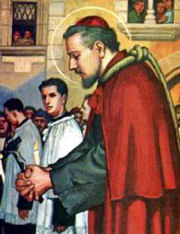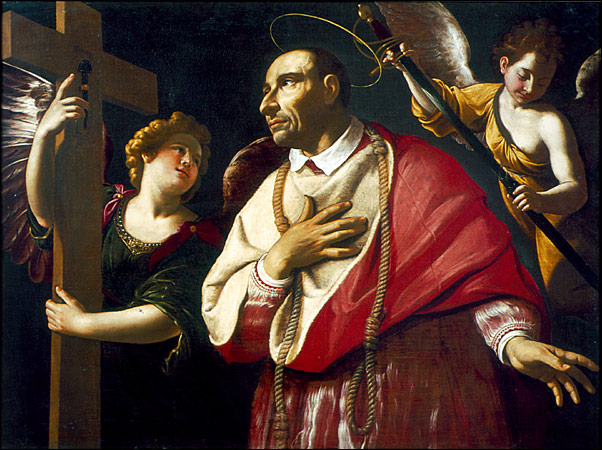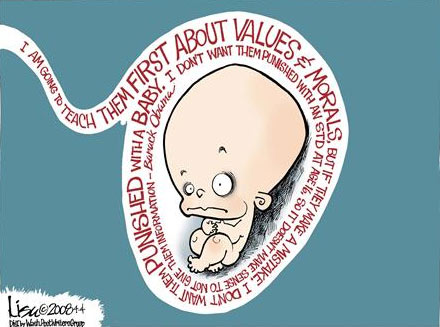
Daily Readings for:November 04, 2013
(Readings on USCCB website)
Collect: Preserve in the midst of your people, we ask, O Lord, the spirit with which you filled the Bishop Saint Charles Borromeo, that your Church may be constantly renewed and, by conforming herself to the likeness of Christ, may show his face to the world. Who lives and reigns with you in the unity of the Holy Spirit, one God, for ever and ever.
RECIPES
ACTIVITIES
o Nameday Ideas for the Feast of St. Charles Borromeo
o Praying for the Dead and Gaining Indulgences During November
PRAYERS
o November Devotion: The Holy Souls in Purgatory
o Little Litany of the Holy Souls
o Prayer of Saint Charles Borromeo
o Litany of Saint Charles Borromeo
LIBRARY
o Lumen Caritatis | Pope Benedict XVI
· Ordinary Time: November 4th
· Memorial of St. Charles Borromeo, bishop
Old Calendar: St. Charles Borromeo; Sts. Vitalis and Agricola, martyrs
St. Charles Borromeo (1538-1584) was a member of a noble family and a nephew of Pope Pius IV. He was made a Cardinal at the age of 23 and assisted the Pope in administering the affairs of the Holy See and in governing the Church. Soon thereafter he was made Archbishop of Milan. His endeavors on behalf of the 19th Ecumenical Council of Trent (1545-1564) were especially meritorious and fruitful. He helped to direct and guide it and bring it to a successful conclusion. He then proceeded to enforce its decrees in the Archdiocese of Milan and thoroughly reformed Catholic life in his See. During a plague he walked barefooted in the public streets, carrying a cross, with a rope around his neck, offering himself as a victim to God for the transgressions of his people.
According to the 1962 Missal of Bl. John XXIII the Extraordinary Form of the Roman Rite, today is the commemoration of Sts. Vitalis and Agricola, martyrs in Bologna.
Don't forget to pray for the Poor Souls in Purgatory from November 1 to the 8th.
St. Charles Borromeo
Charles Borromeo, the bishop of Milan, came from a wealthy, aristocratic Italian family. He was born in the family castle, and lived a rather lavish life, entertaining sumptuously as befit a Renaissance court. He personally enjoyed athletics, music, art, and the fine dining that went along with lifestyles of the rich and famous of the sixteenth century. His maternal uncle, from the powerful Medici family, was pope. As was typical of the times, his uncle-pope made him a cardinal-deacon at age twenty-three and bestowed on him numerous offices. He was appointed papal legate to Bologna, the Low Countries, and the cantons of Switzerland, and to the religious orders of St. Francis, the Carmelites, the Knights of Malta, and others.
When Count Frederick Borromeo passed away, many people thought Charles would give up the clerical life and marry now that he had become head of the Borromeo family. But he did not. He deferred to another uncle and became a priest. Shortly thereafter he was appointed bishop of Milan, a city that had not had a resident bishop for over eighty years.
Although raised to the grand life, Borromeo spent much of his time dealing with hardship and suffering. The famine of 1570 required him to bring in food to feed three thousand people a day for three months. Six years later a two-year plague swept through the region. Borromeo mobilized priests, religious, and lay volunteers to feed and care for the sixty thousand to seventy thousand people living in the Alpine villages of his district. He personally cared for many who were sick and dying. In the process, Borromeo ran up huge debts, depleting his resources in order to feed, clothe, administer medical care, and build shelters for thousands of plague-stricken people.
As if the natural disasters facing Borromeo were not enough, a disgruntled priest from a religious order falling out of favor with Church authorities attempted to assassinate him. As Charles knelt in prayer before the altar, the would-be assassin pulled a gun and shot him. At first, Charles thought he was dying, but the bullet never passed through the thick vestments he was wearing. It only bruised him.
Borromeo combined the love of the good life with the self-sacrificing zeal one would expect of a Renaissance churchman. Once when he was playing billiards, someone asked what he would do if he knew he only had fifteen more minutes to live. "Keep playing billiards," he replied. He died at age forty-six, not at the billiard table but quietly in bed.
—Excerpted from The Way of the Saints, Tom Cowan
St. Charles used the following strong language to the assembly of bishops during the convocation of the Synod:
Let us fear lest the angered judge say to us: If you were the enlighteners of My Church, why have you closed your eyes? If you pretended to be shepherds of the flock, why have you suffered it to stray? Salt of the earth, you have lost your savor. Light of the world, they that sat in darkness and the shadow of death have never seen you shine. You were apostles; who, then, put your apostolic firmness to the test, since you have done nothing but seek to please men? You were the mouth of the Lord, and you have made that mouth dumb. If you allege in excuse that the burden was beyond your strength, why did you make it the object of your ambitious intrigues?
Great was Charles' love of neighbor and liberality toward the poor. When the plague raged in Milan, he sold his household furniture, even his bed, to aid the sick and needy, and thereafter slept upon bare boards. He visited those stricken by the disease, consoled them as a tender father, conferred upon them the sacraments with his own hands. A true mediator, he implored forgiveness day and night from the throne of grace. He once ordered an atonement procession and appeared in it with a rope about his neck, with bare and bloody feet, a cross upon his shoulder—thus presenting himself as an expiatory sacrifice for his people to ward off divine punishment. He died, dressed in sackcloth and ashes, holding a picture of Jesus Crucified in his hands, in 1584 at the age of forty-six. His last words were, "See, Lord, I am coming, I am coming soon." His tomb in the cathedral of Milan is of white marble.
Patron: Against ulcers; apple orchards; bishops; catechists; catechumens; colic; intestinal disorders; diocese of Monterey, California; seminarians; spiritual directors; spiritual leaders; starch makers; stomach diseases.
Symbols: Altar; chalice and host; rope around neck; casket and crucifix; cardinal's hat; word Humiltitas crowned.
Often Portrayed As: Bishop wearing a noose around his neck; cardinal wearing a noose around his neck.
Things to Do:
- Pray the Little Office of the Blessed Virgin in imitation of St. Charles who recited it daily;
- Say a rosary for our Bishops that they will have the courage to be the salt and light in our confused world;
- Learn more about the Council of Trent;
- Pray for vocations and pray for the pastor and the priests in your parish that they will plant the life of grace and help it grow;
- Meditate on the common priesthood bestowed on all of us at baptism and confirmation;
- Do something today to spread the faith, explain some teaching to your children, witness to your neighbor, purchase good Catholic books for others, mindful that "every Catholic is responsible for the salvation of those with whom he lives!" (Pius Parsch)
- From the Catholic Culture library: Charles Borromeo: Hero of Reform and Editae Saepe (On St. Charles Borromeo).
Sts. Vitalis and Agricola
Vitalis and Agricola were two martyrs of Bologna. Their bodies were discovered in 393 during the episcopate of St. Ambrose who was present at the translation of their relics.
The following is a legendary account:
Vitalis, a slave, and Agricola, his master, were cruelly tortured under Diocletian. In vain was Vitalis tempted by promises to renounce his faith; he merely showed himself more constant as a confessor of Christ. He was tortured most dreadfully, but bore all with incomparable patience till in prayer he gave up the spirit. Agricola's sentence was delayed in the hope that the torments of his slave would frighten him into a denial of Christ, but the constancy of Vitalis confirmed him in the faith. He was nailed to a cross and thereby became a comrade and sharer with his servant in the crown of martyrdom (c. 304). Later times distinguished two persons by the name Vitalis, one the martyr of Ravenna, the other Agricola's companion at Bologna; actually there is question that they are but one and the same individual.
—Excerpted from The Church's Year of Grace, Pius Parsch
Symbols: White war horse; spiked club; post; cross and nails.
Indulgences for All Souls Week
An indulgence, applicable only to the Souls in Purgatory, is granted to the faithful, who devoutly visit a cemetery and pray, even if only mentally, for the departed. The indulgence is plenary each day from the first to the eighth of November; on other days of the year it is partial.
A plenary indulgence, applicable only to the Souls in Purgatory, is granted to the faithful, who on the day dedicated to the Commemoration of All the Faithful Departed [November 2 {as well as on the Sunday preceding or following, and on All Saints' Day}] piously visit a church. In visiting the church it is required that one Our Father and the Creed be recited.
To acquire a plenary indulgence it is necessary also to fulfill the following three conditions: sacramental Confession, Eucharistic communion, and prayer for the intention of the Holy Father. The three conditions may be fulfilled several days before or after the performance of the visit; it is, however, fitting that communion be received and the prayer for the intention of the Holy Father be said on the same day as the visit.
The condition of praying for the intention of the Holy Father is fully satisfied by reciting one Our Father and one Hail Mary. A plenary indulgence can be acquired only once in the course of the day.



